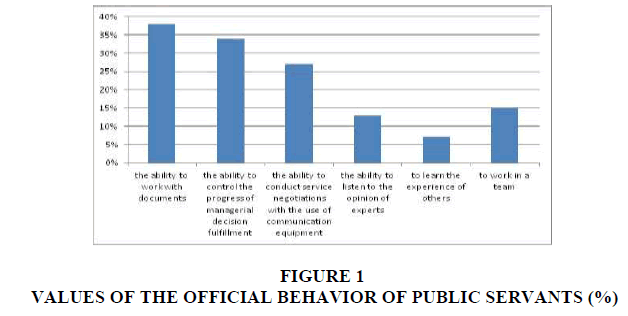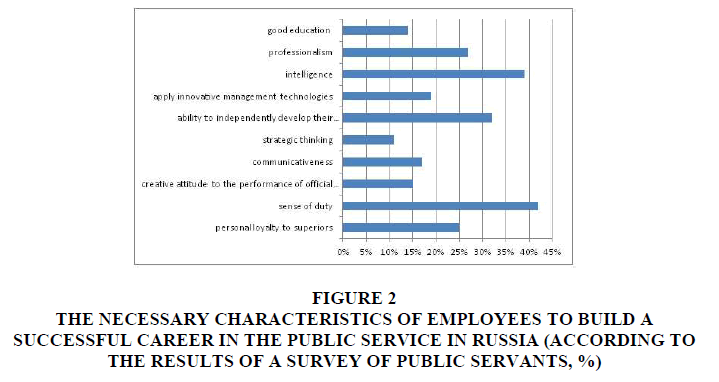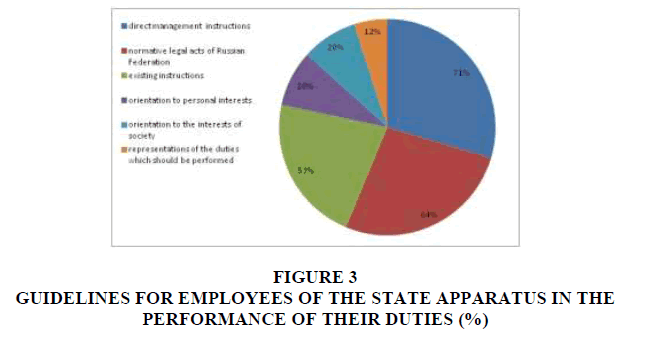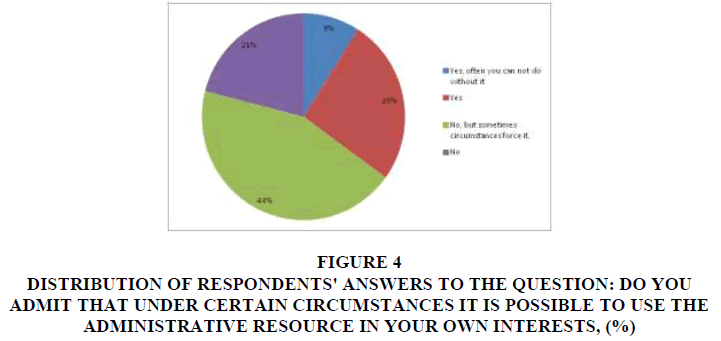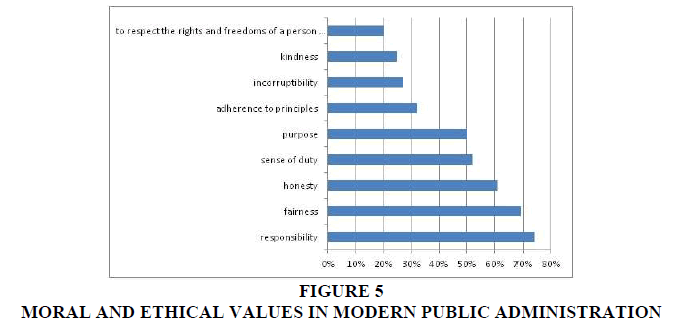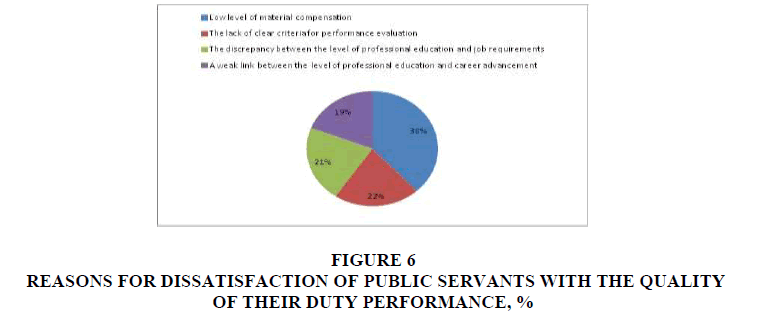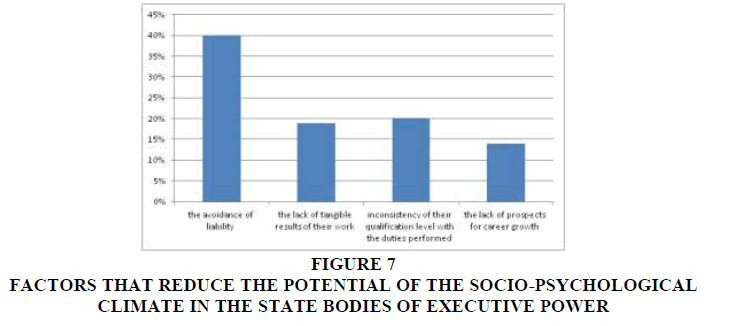Research Article: 2018 Vol: 17 Issue: 6
Socio-Cultural and Psychological Determinants of State Service in Russia
Tatyana Mikhailovna Ryabova, Russian State Social University
Olga Vladimirovna Rogach, Russian State Social University
Elena Victorovna Frolova, Russian State Social University
Abstract
The identification and analysis of socio-cultural and psychological determinants of the public service provides an increase in the quality of management, both by revising the emphasis in the regulation of the official behavior of employees, and by optimizing their internal working conditions. This article provides a revision of the traditional approach to the activities of civil servants, the change of the vector on the prioritization of conditions affecting the sociopsychological situation and official behavior of employees. In the conditions of the Russian reality, where there is the allocation of civil servants in a separate category and administrative resource, of particular importance is the purposeful work on the formation and development of the socio-psychological climate in state bodies, increasing the degree of satisfaction of civil servants with their work. The article uses the method of questionnaire survey, which allowed providing representative representation of civil servants in the study; data verification is achieved through the use of general scientific research methods.
Keywords
Public Service, Culture, Socio-Psychological Climate, Ethical Norms, The Values Of Civil Servants, Official Behavior.
Introduction
Public service is an institution of administrative power, designed to ensure the implementation of the vector of state construction for the purpose of public welfare. Modern research raises the issue of reducing corruption, the development of socially oriented management, the search for new resources of public administration (Pyper & Burnham, 2011; Pedersen et al., 2017). Socio-cultural and psychological determinants of public service occupy a Central place in these processes, without knowledge of which it is impossible to implement a strategic approach to public administration as a whole.
The attention of researchers to the social and psychological well-being of employees from state executive bodies is explained by a number of reasons, which include the need to minimize the negative phenomena of psychological support for their professional activities in connection with the public significance and the public nature of carried out actions. As noted Derkach (2006) in work (Acmeological Development Strategy) the public opinion has been established that civil servants are a special category of people characterized by certain psychological characteristics of an individual, and the tasks that are set before them must be realized even before the level of professional training, because the ethical values that are of paramount importance for state and civil service and belong to the group of general civil principles (Derkach, 2006). The activities of state civil servants, in addition to the performance of duties established by the official regulations, imply the implementation of an official professional-psychological type, which, in its turn, is related with the peculiarities of an official mental state and mood. Besides, the satisfaction with professional activity depends on the ability of state civil servants to realize their professional and psychological potential in it, which in its turn affects his state and mood (Dukhnovsky, 2017). The I-concept, which is the part of the personality basis, ensures the integrity and the stability of its structure and provides social importance to professional attitudes in the development of a civil servant as a subject of professional activity (Noss, 2007). Thus, within the framework of a new model of the state civil service creation in Russia, a special role should be assigned to socio-cultural and psychological determinants.
The relevance of the issues and the specific conditions prevailing in Russia, to put before the authors of the article goal to expand scientific understanding of the assumptions, sociocultural, and psychological bases of forming of official conduct and professional culture within the teams of employees of government.
Literature Review
The review of the literature has been conducted according to the review process defined by Pittaway et al. (2007) and Centobelli et al. (2016) that are well-known in the field of strategic management.
In the works of Magbadelo (2016) the problems of civil service culture and ethics, the problems of human resources development, the lack of competent leadership are considered as the key constraints to the country socio-economic and political development.
The study of training, professional development and career of employees is presented in the works Matei & Matei (2014), Fragkou (2013), Pratama et al. (2015).
The image of a public servant is considered in the works Teodoro & An, 2018; Zamir & Sulitzeanu-Kenan, 2018; Karmys & Bastaubayeva, 2018.
Unfortunately, an objective image of a Russian civil servant today is associated with such negative postulates as corruption, the lack of competence, the lack of control over actions, the impunity for the violation of rights, permissiveness, increased criminalization, and a low efficiency in work. These negative aspects, the closeness to the whole society, the formation of a separate group of “officials” lead to negative attitudes on the part of ordinary people (Ryabova, 2017).
Such organizational characteristics as bureaucratic red tape, hierarchical powers and the lack of specific organizational goals, which are often more present in the administrative sector, can have a negative impact on the motivation of the civil servants themselves and the satisfaction with their work (Bednarczuk, 2018). Bureaucratic values, the lack of interaction with the external environment, authoritarian management style, and rigid subordination are reflected in an employee personality, on his behavior. The employees, who evaluate themselves and their experience above their positions because of their personal characteristics and their specific character, try to find a new position or another type of activity that satisfies their life strategy independently, or they stop in terms of professional development (Frolova et al., 2017).
Public service motivation is considered in the works Irkhin, 2010; Christensen et al., 2017; Vigan & Giauque, 2018; Magomedov, 2014.
Public service motivation has a documented, positive effect on the job satisfaction in the public sector (Kjeldsen & Hansen, 2018). Empirical studies have a positive relationship between public service motivation and individual performance. But public service motivation is the relationship between behaviors (Loon, 2017).
The psychological climate of the organization and its impact on the activities of civil servants is considered in the works Mathies & Ngo, 2014; Jung et al., 2017.
Despite a significant body of research in the field of public service improvement, sociocultural and psychological determinants of employee behavior are still poorly understood. In the context of the study of the internal installations of public servants on compliance with the principle of serving the society out of the focus of the research, usually excluded the environmental conditions influencing the formation of social and psychological climate and service behavior of employees. In their work, the authors aim to expand scientific knowledge in the definition and analysis of socio-cultural and psychological determinants of public service.
Methodology
The study was conducted using a questionnaire survey of civil servants. The use of questionnaires as a leading research method contributed to a wide coverage of respondents (N=849), the possibility of obtaining primary information from the object of study. The advantages of the questionnaire in solving the research tasks set by the authors are: the obtained research materials according to the formalized questionnaire, structuring the research into blocks that provide the disclosure of the relationship of socio-cultural and psychological determinants of civil servants from internal attitudes and external environmental conditions.
Two subjects of the Russian Federation possessing special mentality and advanced experience of use of innovations in training, construction of career trajectories of civil servants were selected as base of research: the city of Moscow and the Moscow region.
The authors conducted a simple probabilistic sample, according to the list of civil servants.
Results
Professional Qualifications and Integrity in the Work of Public Servants
The central position in the system of sociocultural values of state civil servants is assigned to their conscientious and highly professional execution of their official duties. However, according to the results of the survey, more than half of the officials of the state power apparatus note the inconsistency of their professional qualifications with their posts. Every second employee believes that in recent years the development of professional qualities of a state administration official, has a negative dynamics, and the provisions of the science on civil service state remain unclaimed.
The results of the study show, those civil servants, who aware of the importance of professionalism as an organizational value do not consider professional competence to be the factor of their career growth promotion under the current Russian conditions. The current situation reduces the degree of their emotional inclusion in the team work undoubtedly (Schraeder et al., 2005), increases the “the ability to work with documents”, “the ability to control the progress of managerial decision fulfillment” and “the ability to conduct service negotiations with the use of communication equipment”. At that, the satisfaction with the belonging to a collective is reduced among the officials of state executive bodies due to a low degree of “the ability to listen to the opinion of experts”, “to learn the experience of others” and “to work in a team” (Figure 1).
The Basic Elements of the Official Conduct of Public Servants
The assessment of basic elements of official conduct among state executive body officials is of particular interest. These elements are oriented towards the socio-psychological components of an individual. So the overwhelming majority of civil servants note that they do not possess sufficient organizational technologies, which require creative, proactive and informal attitude to the performance of official duties. Modern civil servants do not fully understand the progressive tendencies of those elements of service behavior role increase, in which the decisive factors are not the personal devotion to the authorities and performance, but a creative attitude to the performance of duties, communicative and strategic thinking. Among the socio-cultural and psychological determinants of the civil service in Russia, such characteristics of the state apparatus employees as the ability to develop their service potential independently, master and apply innovative management technologies become more important (Figure 2).
Figure 2: The Necessary Characteristics Of Employees To Build A Successful Career In The Public Service In Russia (According To The Results Of A Survey Of Public Servants, %)
For people who have experience in public service such parameters as intelligence, professionalism and good education are used for their colleague evaluation. It should be noted that all three parameters are the personal characteristics, which indicates that public servants provide great importance to the subjective factors of their development. During the performance of their official duties the state apparatus officials are guided by the following most often: direct management instructions (71%); normative legal acts of Russian Federation (64%); existing instructions (53%) (Figure 3).
Career Wishes
It should be noted that career motivations play a significant role in the motivational orientations of civil servants. At the same time, almost ? of state employees are inclined to believe that they would perform their duties with greater efficiency and effectiveness with a successful career growth. In the course of the study, a direct relationship was established between an effective performance of tasks and the degree of climate favorableness in managerial structures (Table 1), reflected in the level of conflict, stress and other characteristics of the state apparatus team (Pearson's χ² test: χ² (4)=88.454; p<0.01).
| Table 1 The Relationship Between An Effective Performance Of Tasks And The Degree Of Climate Favorability In Management Structures, In Humans |
|||
| Socio-psychological climate in the structures of government | |||
| Quality and performance of tasks | Good | Satisfactory | Bad |
| high | 220 | 129 | 54 |
| medium | 98 | 93 | 55 |
| low | 73 | 35 | 92 |
At the same time, a number of branches of public administration have no developed criteria to assess the efficiency of labor and the performance of state employees. Until now, the criteria for which most civil servants are oriented represent quantitative indicators: the attitudes toward service, the compliance with internal regulations, timeliness of arrival to a duty station and the like, which allows us to speak about the formalization of the civil service organizational culture.
According to the results of the study, the instability of organizational structures and the frequent reorganization of government bodies are affected most negatively by the social and psychological situation and the performance of state apparatus staff. Developing this provision, it can be argued that the evaluation of staff official activities at state administration apparatus by the society and the development of the social and psychological image of a proper and substantial model of the bureaucracy official behavior as an autonomous social and professional group has a negative impact on the development of civil servant image in Russia. Despite often negative feedback from the public about their professional activities, government officials note a steady increase in the effectiveness of their job duties.
The current situation suggests that with a formal restriction of the state apparatus officials the socio-psychological portrait of a modern civil servant should be added with such a touch as the “bureaucratic” nature of official behavior. According to the majority of civil servants, this characteristic seems to be the norm for a modern bureaucratic apparatus. This circumstance ensures the staff stability, but does not promote authority and respect in the eyes of a democratically minded part of society.
Private Interests in the Public Service
An important factor that determines the socio-cultural and psychological determinants of the state civil service in Russia is the possibility of administrative resource use in personal interests, thus creating self-interest and bribery (Figure 4).
Figure 4: Distribution Of Respondents' Answers To The Question: Do You Admit That Under Certain Circumstances It Is Possible To Use The Administrative Resource In Your Own Interests, (%)
The administrative possibilities are not a negative phenomenon, however, the fact of belief rooted in the official minds, that it is possible to use administrative resources for personal purposes with impunity in the current conditions of Russian reality, is regarded negatively. This has the most destructive and depressing effect on the functioning of the state apparatus and causes various dysfunctional manifestations.
Public Service Ethical Issues
The analysis of the civil service ethical problems as the main aspects of an organizational culture and psychological atmosphere representation in the collectives of civil servants made it possible to reveal such moral qualities in their work as fairness, incorruptibility, respect for citizens' rights and freedoms, adherence to principles, and so on. It should be noted that the ranking of moral and ethical values in modern state governance puts “honesty” only to the third place, while “adherence to principles” and “incorruptibility” occupy the sixth and seventh place, respectively. At the same time, only two out of every ten civil servants are inclined “to respect the rights and freedoms of a person and a citizen” (Figure 5).
In the conditions when the professional activity of state executive body officials is a closed system for a wide range of people, taking into account the deficit of the moral principles of the bureaucracy official behavior, the corruption in the eyes of society has become an indispensable attribute of work in the apparatus of public authorities. The state apparatus, in which officials serve, is guilty of creating an atmosphere for the use of the main aspects of a bureaucratic organization by civil servants as the means of meeting the personal needs of officials, while the atrophy of civil servant honesty and incorruptibility creates a favorable environment for the corrupt state apparatus.
This condition provides the basis for the conclusion that the potential of sociocultural and psychological determinants of the state civil service is not directed at serving the people, but at the gaining of privileges and the satisfying of personal needs at the expense of society interests. The orientation toward the satisfaction of their own interests destructive for the sense of justice among state officials deforms the psychology and the way of thinking among the employees of the state apparatus.
Factors that Reduce the Potential of the Socio-Psychological Climate in the Public Service
The results of the study showed that the status instability of civil servants causes a serious concern among them. In the opinion of 34.6% of respondents, their official position is unstable, while 40.4% tend to take a worthier place in the society. At the same time, 48.1% of the polled state employees associate their work in the federal authorities with career prospects, and 44.2% of employees hope for the opportunity to earn.
The results of the study showed the dissatisfaction of the executive authority officials with the quality of their duty performance due to the following reasons (Figure 6).
Figure 6: Reasons For Dissatisfaction Of Public Servants With The Quality Of Their Duty Performance, %
At that, civil servants call the following factors as the most significant factors that reduce the potential of the socio-psychological climate in the state bodies of executive power and are subject to priority regulation such as: the avoidance of liability (40%) and inconsistency of their qualification level with the duties performed (20.1%) (Figure 7).
Figure 7: Factors That Reduce The Potential Of The Socio-Psychological Climate In The State Bodies Of Executive Power
Human resources of public authorities determine the effectiveness of management. One of the important personal and professional qualities identified with public servants is professionalism. In the context of the current steady trend of growing distrust of citizens to the institutions of state power and, in particular, to the public service, such personal qualities of civil servants as: responsibility, justice, honesty, sense of duty occupy the main positions among the important moral qualities of a public servant. As the results of the study showed, despite the established “bureaucratic” nature of the official behavior of employees in Russia, they do not seek to change this circumstance and note the positive aspects of this moment. The administrative resource remains an important component of public service in Russia and the installation of the employee to use it in personal interests generates corruption.
Socio-cultural and psychological determinants of public service are determined by the internal attitudes and external environmental conditions of employees of the authorities. Using the method of questionnaire survey it was found that: in moral attitudes and behavior patterns of employees, loyalty to higher officials and bodies prevail. The dominant guidelines in the professional activity of civil servants are a clear hierarchy and subordination, mandatory subordination to the orders and orders of higher structures.
The transformation of public service from the position of increasing its moral and ethical aspect, as well as the involvement of personnel management technologies from business (dependence of wages on the efficiency of activities, flexible system of surcharges and bonuses, increasing professionalism) will not only increase its prestige, but also create a favorable image, reduce corruption in the authorities.
Conclusion
Socio-cultural and psychological determinants of public service are determined by the internal attitudes and external environmental conditions of employees of the authorities. Using the method of questionnaire survey it was found that: in moral attitudes and behavior patterns of employees, loyalty to higher officials and bodies prevail. The dominant guidelines in the professional activity of civil servants are a clear hierarchy and subordination, mandatory subordination to the orders and orders of higher structures.
The result of the research is the hypothesis confirmation that the allocation of civil servants in a separate category and administrative resource is reflected in their official behavior and determine their social and psychological situation. At the same time, the very specifics of the executive body operation creates the prerequisites for psychological atmosphere suppression in the collective of civil servants, since there is the lack of a mechanism for a team cohesion development, the pressure from the leadership, the influence of public opinion, the removal of activity results over time. All this, in its cumulative reflection, provokes the decrease of satisfaction level with work among the officials.
On the basis of the data obtained, it is concluded that the allocation of civil servants in a special privileged class should serve to increase motivation to carry out activities at a high professional level with greater efficiency. Whereas today there is another situation-alienation from society and solutions of socially significant problems, bureaucracy and corruption.
The authors see the solution of this problem in a purposeful approach to the formation and development of the socio-psychological climate in the state authorities, modernization of the existing relations with an emphasis on socio-cultural and psychological factors of public service.
References
- Bednarczuk, M. (2018). Identity and vote overreporting by Bureaucrats: Implications for public service motivation. The American Review of Public Administration, 48(2), 148-158.
- Centobelli, P., Cerchione, R., Murino, T., & Gallo, M. (2016). Layout and material flow optimization in digital factory. International Journal of Simulation Modelling, 15(2), 223-235.
- Christensen, R.K., Nesbit, R., & Stritch, J.M. (2017). The role of employees’ public service motives and organizational commitment in workplace giving campaigns. The American Review of Public Administration, 48(7), 644-658.
- Derkach A.A. (2006). Acmeological development strategy. RAGS.
- Dukhnovsky S.V. (2017) Features of the mental state and mood of the civil agent services with different professional and psychological type of the personality. Scientific Notes, 2, 19-27.
- Fragkou, P. (2013). Training civil servants to ERMIS IT system for the purposes of directive 2006/123/EC. Procedia-Social and Behavioral Sciences, 73, 430-437.
- Frolova, E.V., & Tat'yana, M.R. (2018). Socio-cultural and value paradigms of public civil servants in Russia. Economic i Sotsialnye Peremeny, 1(55), 191-200A.
- Frolova, E.V., Ryabova, T.M., & Rogach, O.V. (2017). Bureaucrat image in Russia. Journal of Advanced Research in Law and Economics, 8(1 (23), 52.
- Hsieh, J.Y., & Liou, K.T. (2018). Collaborative leadership and organizational performance: Assessing the structural relation in a public service agency. Review of Public Personnel Administration, 38(1), 83-109.
- Irkhin Yu.V. (2010). The value of the formation of a system of competencies and motivations in the training of civil servants in modern conditions. Bulletin of the Volga Institute of Management, (2), 4-10.
- Jung, C.S., Chan, H.S., & Hsieh, C.W. (2017). Public employees’ psychological climates and turnover intention: evidence from Korean central government agencies. Public Management Review, 19(6), 880-904.
- Karmys, G., & Bastaubayeva, A. (2018). SWOT and PEST analysis of HR-processes digitalization in the public service of Kazakhstan. Public Administration Issues, (1), 140-163.
- Kjeldsen, A.M., & Hansen, J.R. (2018). Sector differences in the public service motivation-job satisfaction relationship: exploring the role of organizational characteristics. Review of Public Personnel Administration, 38(1), 24-48.
- Kjeldsen, A.M., & Hansen, J.R. (2018). Sector differences in the public service motivation–job satisfaction relationship: exploring the role of organizational characteristics. Review of Public Personnel Administration, 38(1), 24-48.
- Magbadelo, J.O. (2016). Reforming Nigeria’s federal civil service: Problems and prospects. India Quarterly, 72(1), 75-92.
- Magomedov K.O. (2014) Personnel policy in the system of state power and management: monitoring of the main directions. Monitoring Public Opinion: Economic and Social Changes, 3(121), 40-46.
- Matei, A., & Matei, L. (2014). Instructional design for administrative sciences. A case study for civil servants training. Procedia-Social and Behavioral Sciences, 116, 1930-1933.
- Matei, L., Matei, A., & Lazar, C.G. (2016). Public service performance and good administration. Socio economic empirical evaluations. Procedia Economics and Finance, 39, 335-338.
- Mathies, C., & Ngo, L.V. (2014). New insights into the climate-attitudes-outcome framework: Empirical evidence from the Australian service sector. Australian Journal of Management, 39(3), 473-491.
- Noss, I.N. (2007). AC diagnostic of civil services. Moscow: MGOU.
- Pedersen, M.J., Stritch, J.M., & Taggart, G. (2017). Citizen perceptions of procedural fairness and the moderating roles of belief in a just world and public service motivation in public hiring. Public Administration, 95(4), 874-894.
- Pittaway, E., Bartolomei, L., & Rees, S. (2007). Gendered dimensions of the 2004 tsunami and a potential social work response in post-disaster situations. International Social Work, 50(3), 307-319.
- Pratama, A.P., Ghazali, A., Putranto, N.A.R., Iswari, K.R., Wisesa, A., & Febriansyah, H. (2015). Civil servants competence in Indonesia: Suggestions for future research in the context of business. Procedia-Social and Behavioral Sciences, 169, 371-377.
- Pyper, R., & Burnham, J. (2011). The British civil service: Perspectives on decline and modernisation. The British Journal of Politics and International Relations, 13(2), 189-205.
- Ryabova, T.M. (2017). Formation technology of image of civil servant. Social Policy and Sociology, 2, 155-163
- Schraeder, M., Tears, R.S., & Jordan, M.H. (2005). Organizational culture in public sector organizations: Promoting change through training and leading by example. Leadership & Organization Development Journal, 26(6), 492-502.
- Teodoro, M.P., & An, S.H. (2018). Citizen-based brand equity: A model and experimental evaluation. Journal of Public Administration Research and Theory, 28(3), 321-338.
- Van Loon, N.M. (2017). Does context matter for the type of performance-related behavior of public service motivated employees? Review of Public Personnel Administration, 37(4), 405-429.
- Vigan, F.A., & Giauque, D. (2018) Job satisfaction in Africanpublicadministrations: A systematic review. International Review of Administrative Sciences,84(3), 596-610
- Zamir, E., & Sulitzeanu?Kenan, R. (2018). Explaining self?interested behavior of public?spirited policy makers. Public Administration Review, 78(4), 579-592.
